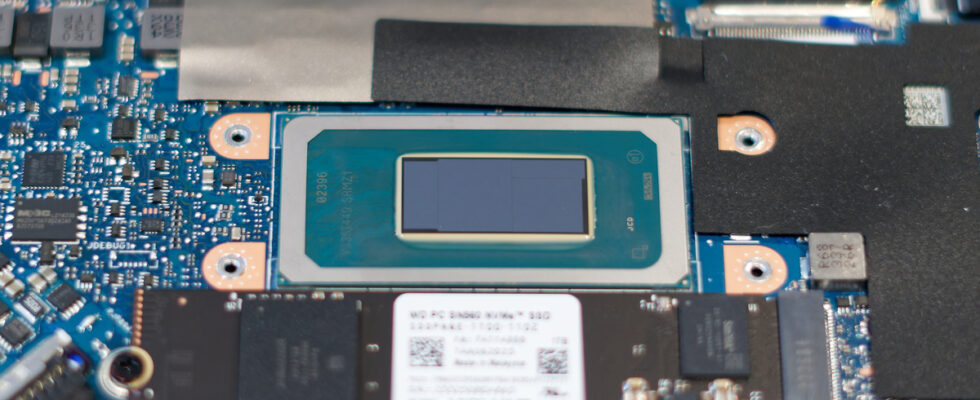Asus Zenbook 14 Oled (Core Ultra 7)
Introductory price €1299
LDLC
€1,299.98Nine
Discover the ultra-portable Chromebook Plus!
I discover
How the pricing table works
Turn off your ad blocker to access all of the links above.
The Intel Core Ultra 7 155H processor present in the ZenBook 14 Oled (UX3405MA) is the first representative of the Meteor Lake platform. The opportunity for us to take a closer look at the performance of this processor.
We can see the separations between each of the tiles of Meteor Lake. © Les Numériques
The Intel Core Ultra 7 is equipped with 6 Core-P and 8+2 E-Cores that can reach a maximum of 4.8 GHz and 3.8 GHz. These cores, made with the new Intel 4 (7 nm) engraving process, take place within the Compute tile, itself accompanied by the SoC, graphics and IO tiles, all assembled via the Foveros packaging process.
Unimpressive raw performance
Les Numériques performance index (the bigger the better). © Les Numériques
The Core Ultra 7 155H’s performance index puts it neck and neck with the Core i7-1360P installed in the Framework Laptop and Apple’s M2 in the iMac. Compared to its direct competitor, AMD’s Ryzen 7 7840U, the Core Ultra 7 is 13% less efficient.
In detail, in the Cinebench R23 and Geekbench 5.4 benchmarks which evaluate the raw performance of the processors on one core and on all the processor cores, the Core Ultra 7 155H does not particularly shine.
In single thread, it is systematically less efficient compared to Apple’s M3, AMD’s Ryzen 7 7840U and even Core i7-1360P from the previous generation. However, it performs well in multithreading, particularly on Geekbench 5.4, where the Core Ultra 7 155H seems to benefit from the speed of its LPDDR5.
Since benchmarks are only an indicator of performance, here are the results of our in-house compression, encoding and photo tests.
In applications, the Intel Core Ultra 7 155H is systematically slower than the Ryzen 7 7840U to accomplish its task, and more particularly when said task is long, as during our Handbrake encoding of our 10 min 4K video.
We also analyzed the behavior of the Core Ultra 7 155H during this same encoding.
During the first 40 seconds, the Core Ultra 7 155H of the ZenBook 14 Oled runs at 2.93 GHz and 2.61 GHz for the P-Cores and E-Cores respectively, with an envelope of 47 watts; between 40 seconds and 10 minutes of processing, we go respectively to 2.2 GHz and 1.88 GHz for 29 watts; finally, after 10 minutes of encoding the frequencies drop to 1.76 GHz and 1.09 GHz for an envelope of 20.7 watts.
In comparison, the Core i7-1360P maintains its frequencies at 2.92 GHz and 2.18 GHz for a power envelope of 28.32 watts, while the AMD Ryzen 7 7840U turbines at 3.44 GHz for a power envelope of 28.32 watts. power maintained on average at 32 watts.
Still lower battery performance
Important point for nomadic users, we have repeated all of our battery tests.
The performance index speaks for itself: unplugging the ZenBook 14 Oled from its charger drops performance by 27% (from 132 to 96). A “normal” behavior on Windows PCs that we had already noticed a few months ago and which has therefore not changed with the arrival of Meteor Lake.
Remember that on this point, Apple MacBooks featuring the Apple M range of processors remain the champions, since performance is unchanged whether the charger is plugged in or not.
Too little autonomy increase
The last point that Intel insisted on during its presentation: autonomy. According to Intel’s measurements, Meteor Lake would be 25% more energy efficient than the previous generation, and would above all show much greater gains compared to the Ryzen 7 7840U. A statement that unfortunately it is technically impossible for us to verify.
However, we were able to compare with two ZenBook 14 Oleds with the same screen definition and above all the same battery capacity (75 Wh), the first was equipped with the Core i7-1260P and the second with the Core Ultra 7 155H.
Remember that our battery test protocol is particularly well-defined: our favorite series is launched under Netflix in Chrome with a screen set to 200 cd/m²; our headphones are plugged in with the volume at 50%, the keyboard backlit and Bluetooth turned off.
The increase in autonomy is far from breaking the ceiling, since the transition from the Core i7-1260P to the Core Ultra 7 155H on the ZenBook 14 Oled and its 75 Wh battery only saves around thirty minutes, a gain by 7%. We are therefore far from the 20% autonomy announced by Intel in video playback.
With Meteor Lake, Intel launched its small revolution with new manufacturing and packaging processes, but it is clear that on the most expected points – performance and autonomy – the results are somewhat disappointing. There remains one point to evaluate which will be the subject of another Lab: the performance of the new graphics part integrated into Meteor Lake.
